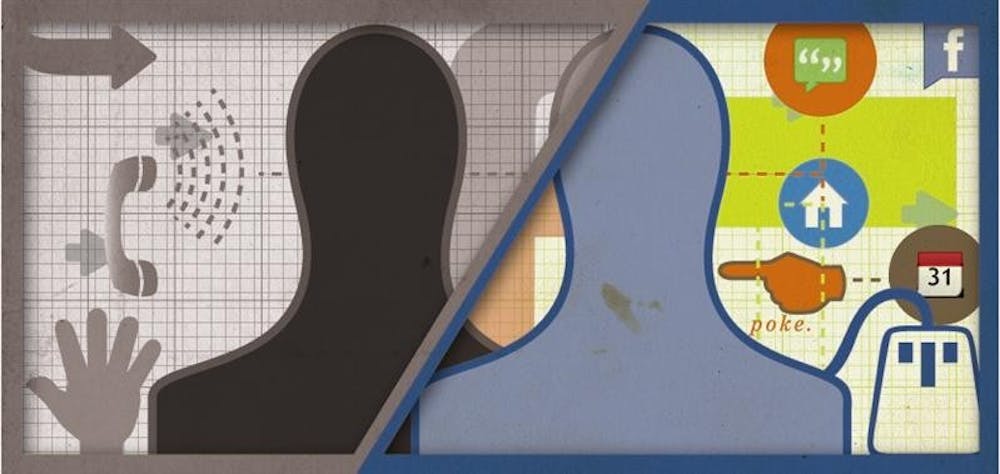Blair Rogers was nervous about starting at IU and moving several states
away from her home in Arizona. However, she was able to meet friends
beforehand on Facebook, many of whom she considers close friends today.
Junior Jeff Schinella said one of his good friends at IU was discovered
by accident on Facebook. Another one of his friends was searching for
someone he had just met when school started, but he got the name wrong
and messaged someone else – someone who is now a good friend.
As Facebook turns 5 years old with over 175 million users, many
students are joking about life before the social network: How did
people do it?
Whether it’s meeting new friends, keeping in touch with old friends,
hearing about parties and other events or staying in contact with
members for a class project, Facebook has become a social staple for
college students.
However, some wonder how this new technology affects social behavior.
Assistant journalism professor Emily Metzgar, who teaches a course
called Issues in New Communication Technology, said that online social
networks haven’t made us less social, but “differently social.”
She said new communication technologies like Facebook can be a social
process, but they raise questions about how users develop the same
social skills.
Sophomore Elisabeth Wurm said she likes Facebook a lot, but she could
survive without it. During a weekend trip with friends, Wurm didn’t
have the Internet and said it was strange not to have that form of
communication. On the other hand, she also enjoyed the face-to-face
interaction.
“We’ll become a socially awkward generation,” Schinella said.
While Facebook makes it easier to stay in touch with old friends, he
said, it also makes it to easier to avoid hard conversations in person,
such as a breakup.
Relationships can be easily ended over the social network by the click
of a mouse, and Wurm joked that a relationship isn’t official until
it’s on Facebook.
Assistant telecommunications professor Mark Deuze, who teaches a course
called Media Life, said Facebook and other social networking sites
havearger social trend of shorter, less serious relationships compared
with 20 or 30 years ago, “which is amplified online.”
He agreed that Facebook has made us more social, but in a different
way. He said online social networking has become widespread because of
the technology and availability of the Internet, but also because there
was a demand – it was “built on an existing social pattern.”
“It was like wildfire (when Facebook started),” IU law student Tim Flowers said.
Flowers said that he got Facebook by his junior year, however many other students already had it.
As an undergraduate at the all-male Wabash College, he said Facebook
was a good tool to find parties and “before that, we all used AOL
(instant messenger), and we found out about stuff from people’s away
messages,” he said.
Deuze said Facebook grew quickly on college campuses because the
college experience became “mass scale,” with students more likely to be
in class with 300 or 400 people, as well as many students taking
classes off campus.
Facebook is a way around the anonymity, he said, similar to the reason the greek system was set up.
As far as the classroom, he said professors have to provide more than
information because its already easy to find on the Internet – making
sense of the information is the professor’s job.
Metzgar agreed that “what we are expected to know what is changing – do
we need to memorize, or can we just know how to find it online?” She
said that universities will have to grapple with defining this
difference between knowledge and learning.
Despite some professors’ dislike for surfing the Web in class, whether
for information or Facebooking or not, Metzgar, who attended college in
the 1990s, said she was guilty of working on crossword puzzles during
class.
“The fact that students aren’t paying attention is not new,” she said.
Deuze also didn’t seem to think students are less attentive because of
Facebook. However, he worried about what profiles say about us.
“We want to be social, create groups, have many friends – it’s great, a
lot of fun but it makes us walking billboards,” he said. Facebook pages
create “a public persona,” which isn’t natural, he said.
Schinella and Wurm agreed that there are superficial aspects to the online friendships.
“There are some things I won’t put on Facebook, like relationship
status,” Schinella said. “The people that know me will know that.”
“When people send you 200 birthday messages, you wonder who’s sincere, but it’s still nice,” Wurm said.
While the pessimistic outlook is that we’re now more socially isolated, her outlook is more optimistic.
“If we’re more connected,” he said, “we can have more of an impact.”
Our social lives: before and after Facebook
A look at our social lives before and after vitual poking, stalking and 25 things

Get stories like this in your inbox
Subscribe




